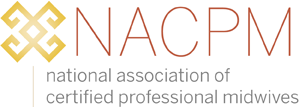What does the future hold for childbearing families? Who are the CPMs of the future and what contribution will they make to improving the health and well-being of our people? How do we prepare today to bring forward a profession that is fully capable and empowered to meet the needs of the future?
The leadership team of NACPM has been on a quest to deepen our understanding and broaden our thinking about these questions. Challenged by CPMs and other stakeholders who participated in the first national CPM Symposium in 2012, we have been particularly focused on the role that CPMs can play in reducing infant mortality and ending perinatal disparities. We have also been examining the history and current issues of racism in our society and in our profession to more fully commit to increasing access to midwifery care for all childbearing people and increasing access for all aspiring midwives to the CPM profession.
Our quest has led us to many outstanding resources, caused us to commission new research to better understand the landscape, contributed to our thinking about the role of NACPM state chapters, and deepened our resolve to achieve state licensure and federal recognition of CPMs. We have been sharing information and insights as we ourselves pursue this quest on our website, in newsletters, and through our chapter collaboration calls. In January 2017, NACPM will launch a new webinar series on Equity, Race and Access to Midwifery to learn more and identify action steps our profession can take to impact health outcomes and increase diversity within the profession.
NACPM Webinars on Equity, Race and Access to Midwifery
Our new webinar series will include presentations by national experts in health and social justice, disparities in maternal and child health, and the challenges of diversifying health professions. Important research on the experiences of black midwives and students will be presented to inform our thinking about education and practice opportunities. We will learn what new research in epigenetics can tell us about the impact of racism on health outcomes. We’ll explore why the benefits of concordant care – health care provided to a member of a community by a member of the community — and why increasing the number of midwives of color is so important.
Save these dates now, and look out for more information as additional speakers are confirmed!
Thursday, January 5, 2017 from 2:30 to 3:30 pm ET - Dr. Michael C. Lu, Associate Administrator of the Maternal and Child Health Bureau (MCHB) of the Health Resources and Services Administration , will describe his 12-point plan to reduce black-white disparities in birth outcomes using a comprehensive Life-Course approach that has become seminal in maternity care in the U.S. Dr. Keisha Goode will serve as Discussant, highlighting the significance of Dr. Lu’s work to midwifery followed by an opportunity for questions and discussion.
Thursday, January 26, 2017 from 2:00 to 3:30 ET - A panel of researchers and policy experts will examine will examine how racism has specific health consequences that cross socio-economic lines, describe fascinating new research on the physiological effects of racism, summarize key literature on race and maternity care and discuss the implications for midwives.
Thursday, February 23, 2017 from 2:00 to 3:30 ET - Despite a long history of midwifery in the black community, black women currently represent less than 2% of the nation’s reported 15,000 midwives. At the same time, black women and infants experience the worst birth outcomes of any racial-ethnic cohort in the United States. In a landmark study completed in 2014, Keisha Goode, PhD, interviewed black midwives to better understand how the denigration of black midwives in the early 20th century is still manifesting itself in their experiences and perceptions of predominantly white midwifery education programs and professional organizations. She will report on her research and discuss the policy implications.
Nancy Anderson, MD, MPH, will present the findings of her research regarding the barriers encountered by women of color who wish to enter the midwifery profession. This qualitative study, commissioned by NACPM in 2014, reveals important insights that should inform scholarship and mentorship programs intended to develop a more representative midwifery workforce.
A Brief List of Resources:
NACPM’s Social Justice and Birth webpage includes a list of initiatives undertaken by midwives of color to eliminate birth outcome disparities
The Anti-Racism and Anti-Oppression Work in Midwifery group of midwives and birth workers, founded at the 2012 CPM Symposium, is working to deepen our shared understanding and take action to dismantle institutional racism and oppression in midwifery. They welcome those interested in working toward and learning about anti-racism and anti-oppression in midwifery to join their Facebook group to get connected and stay up to date.
Racial Equity Tools is designed to support individuals and groups working to achieve racial equity. This site offers tools, research, tips, curricula and ideas for people who want to increase their own understanding and to help those working toward justice at every level – in systems, organizations, communities and the culture at large.
